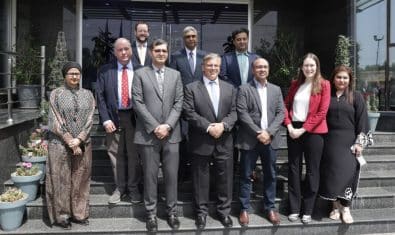The Appellate Tribunal Inland Revenue Islamabad on Monday declared that there is no bar under international law for the state of resident (Pakistan) to impose a tax on income from property situated in another country (UAE).
Details of the said case revealed that the appellant taxpayer is an individual who derives income from salary and foreign source immovable property income. The case was selected for audit under section 214D of the Income Tax Ordinance and intimation in this regard was issued by the concerned Commissioner. Thereafter, an information document request under section 177(1) of the Ordinance was issued to the taxpayer through IRIS.
Subsequently, the case of the appellant was transferred to the AEOI Zone Islamabad. An information document request was once again issued to the appellant wherein the appellant was requested to furnish various details, documents, and other related information about the declaration made in the income tax return filed by the appellant for the tax year 2017. The appellant filed a reply along with certain documentation on December 25th, 2020.
The authorized representative (AR) appearing on behalf of the appellant submitted that there is no dispute that the appellant is a resident person and the immovable property in question is situated in Dubai and rental income is derived from that property. The learned AR drawing force from paragraph 1 of Article 6 of the double taxation avoidance agreement (DTAA) between Pakistan and the government of the UAE tried to impress upon that as the income derived by a resident of a contracting state from immovable property (including income from agriculture or forestry) situated in the other contracting state, may be taxed in that other state, therefore, the rental income of the property owned by the appellant at Dubai could not be brought to tax in Pakistan.
It was submitted by the AR that the expression may be taxed in means “shall be taxed only in” a particular state as per the interpretation accorded to the same by different courts.
The learned AR taking support of various judicial pronouncements submitted that Article 6(1) of the Pakistan-UAE tax treaty vested an exclusive taxing right with the state of source and the state of residence was not empowered to levy any tax, even if the state of source did not exercise its power to levy tax.
The AR in support of his aforesaid claim submitted that neither Article 6(1) nor protocol to the tax treaty expressly recognized the right of the state of residence of the owner to tax income from immovable property situated in the State of the source. It was thus the claim of the AR that the income from an immovable property could be taxed only in the state of the source. Further, it was submitted that after the treaty was signed by the two countries the Ordinance could no longer be the law governing the taxability of such income in the two countries but only the treaty governs such taxability and thus the provisions of section 4, 10, 11 and 15 of the Ordinance could no longer be looked into for this purpose.
Concerning Article 6(1) of the treaty regarding taxability of income tax from immovable properties, it urged on behalf of the appellant that the word ‘may’ would also mean in that context ‘must’ or ‘shall’ because the situs of the property has to be considered and if the situs of the property is situated in Dubai, the income from the property can be assessed to tax only in that country and again under the provisions of the treaty in question, such income cannot be included in the total income in Pakistan. Further, clause 3 of Article 6 refers to income derived from the direct use, letting, or use of any other form of Immovable property.
The distributive rules use the word “shall be taxed only,” “may be taxed,” and “may also be taxed”. Thus, if a contracting state is to give an exclusive right to tax a particular kind of income, then a relevant article of convention uses the phrase “shall be taxed only”. As a rule, such an exclusive right is given to the state of residence, though there are a few articles where the exclusive right to tax is given to the state of the source. The phrase “shall be taxed only” precludes another contracting state from taxing that Income.
Therefore, there is no contradiction between the provisions of the DIM and the Ordinance. Pakistan has not waived all the rights to tax under Article 6 of the relevant DIM which provides that Pakistan shall give credit to the taxes paid in the country of source.
Further, an agreement can give different types of reliefs either by way of ‘avoidance’ or by way of ‘credit’ to eliminate double taxation; that ‘credit’ method, as well as ‘avoidance’ method, will have to be decided with reference to the provisions in the agreement; that wherever the expression used in the treaty is “income shall be taxable only in” or “shall not be taxed in” or “shall be exempt from tax in”, what is contemplated Is the avoidance method; that, on the other hand, whenever the expression used is “income may be taxed” what is contemplated is the relief or the credit method; that Article 24(2) of the Pakistan-UAE treaty also indicates that the said treaty contemplated the credit method, Article 24(2) is not a residuary article in respect of forms of income not otherwise specified In the treaty; whenever it was intended that there should be a residuary clause, it has been specifically so provided in various other treaties, most treaties, including the OEDC model treaty and the Pakistan-UAE treaty, have specific residuary clauses in addition to the Article 24(2) where it is stated that subject to the provisions of paragraph 2 of Article 24 items of income of a resident of a contracting state, wherever, arising, which are not expressly dealt with the foregoing articles of this convention, shall be taxable only In that contracting state.
Therefore, if the said Article 24(2) was meant to operate as a residuary clause covering heads of income not specifically mentioned, there was no need for such a specific article in the other treaties; Article 24(2) of the Pakistan-UAE treaty itself makes it clear that it applies only when tax is payable “by the provisions of the Agreement which means it applies only where tax is payable by or is relatable to one of the articles of the agreement. Otherwise, the treaty would be meaningless and would serve no purpose since this contention of the learned AR for the appellant overlooks the basic fact that under section 107 read with section 103(1) of the Ordinance, the taxpayer can seek relief only if he provides that he had paid tax in the other country and on the other hand, under Article 24(2) of the treaty relief is available whenever a tax is payable under the laws of UAE.
The words “tax paid” and “tax payable” are two different concepts recognized by the Courts. Under the principles of international law, the fiscal jurisdiction of a state to tax any form of income generally arises from either the location of the source of income within its territory or the residence of the taxpayer within its territory.






















